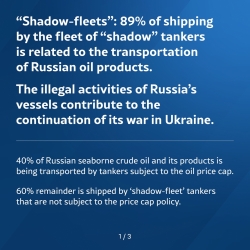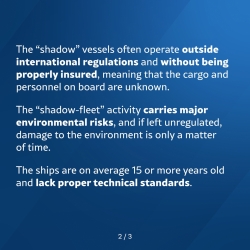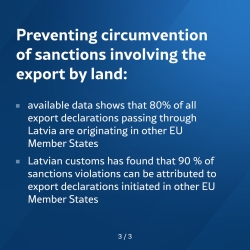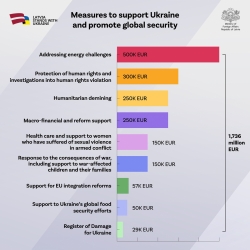The Foreign Affairs Council adopts sanctions on Iran and designates six persons over actions destabilising Moldova
Further military support to Ukraine, stronger sanctions against Russia and third countries providing support to Russia in its aggression against Ukraine, sanctioning Iran and six natural and legal persons in Moldova, the situation in the Middle East, and the upcoming votes in Moldova (presidential elections and a referendum on accession to the EU – on 20 October) and Georgia (parliamentary elections – on 26 October) – those were key topics addressed at the European Union’s Foreign Affairs Council in Luxembourg on Monday, 14 October.
At the EU Foreign Affairs Council meeting, the Ukrainian Foreign Minister Andrii Sybiha addressed his colleagues via videoconference to provide updates on the latest developments on the ground. Andrii Sybiha thanked EU countries and their people for support provided to Ukraine. At the same time, he highlighted the critical situation in the energy sector, which is getting urgent ahead of winter, and he called for the much-needed assistance.
At the suggestion of the Latvian Minister of Foreign Affairs, Baiba Braže, the Special Envoy of the European Commission for the Implementation of EU Sanctions, David O'Sullivan, joined the Foreign Affairs Council meeting.
Foreign Minister Baiba Braže: “Security in Europe is closely linked to Ukraine’s success on the battlefield, so the priority for all of us is further military support for Ukraine, overall containment of Russia, and a stronger sanctions pressure, including on countries that support Russia in its war of aggression against Ukraine. It is vital for the EU to ensure that third countries – including Iran, North Korea, China – do not support Russia’s war of aggression against Ukraine. Ukraine’s allies should also lift any restrictions on military support to Ukraine.”
“I am happy that the EU Special Envoy for the implementation of sanctions, David O'Sullivan, has joined the Foreign Affairs Council today to update EU foreign ministers on the current situation with sanctions against Russia. Sanctions pressure on Russia must be sustained and new sanctions approved by the end of the year. The EU framework for restrictive measures to combat Russia’s hybrid threats established on 8 October is very much welcome. At the same time, it is important to impose additional restrictive measures in the field of energy, trade, finance, and disinformation, and to make further effort to counter sanction circumvention – by laying down tighter measures against circumvention of sanctions through third countries, and narrowing considerably the scope of exceptions permitting the issuance of licences for dual-use items. New barriers should also be raised in trade with Russia,” Baiba Braže underlined.
In a discussion on sanctions against Russia, Baiba Braže emphasised that every effort must be made to weaken Russia’s economy which enables the country to finance its war machinery, and it is clear at this point that too little has been done. A major contribution to Russia’s economy is still being brought by its oil export, for the most part shipped by the so called “shadow fleet”: 89% of shipping by the fleet of “shadow” tankers is related to the transportation of Russian oil products. 40% of Russian seaborne crude oil and its products is being transported by tankers subject to the oil price cap, while the majority 60% is shipped by ‘shadow-fleet’ tankers that are not subject to the price cap policy thus fuelling Russia’s war economy.
Baiba Braže called on Special Envoy O’Sullivan and her counterparts to make more of an effort to curb the operation of the “shadow fleet”. In addition to contributing to Russia’s economy, the “shadow-fleet” activity carries major environmental risks, with vessels operating outside international regulations and lacking proper technical standards and insurance.
As regards preventing circumvention of sanctions that involve the export by land, Baiba Braže recalled that 80% of all export declarations passing through Latvia are originating in other EU Member States. The Latvian customs authority has established that 90 % of sanctions violations can be attributed to export declarations initiated in other EU Member States.
Baiba Braže thanked David O'Sullivan for his efforts on the introduction and implementation of sanctions against Russia, highlighting in particular the work with third countries and achievements in reducing the ways to circumvent sanctions. As early as this coming Thursday, 17 October, David O’Sullivan arrives in Riga on a working visit to discuss current situation in the sanctions field with the Foreign Ministry experts, as well as taking part in the Riga Conference.
EU foreign ministers also discussed the situation in the Middle East. Baiba Braže condemned the attack on Israel by Iran and Hezbollah and also highlighted Iran’s destabilising role in European security. She also stressed the importance of a cease-fire and respect for international humanitarian law. “I welcome the new EU sanctions on Iran, which will make it possible to reduce Iran’s support for Russia in its war against Ukraine. Sanctions on Iran should be further tightened,” Baiba Braže asserted.
The EU Foreign Affairs Council also discussed the situation in Georgia and Moldova, in the context of the forthcoming elections in the countries. “We are happy about Moldova’s aspirations towards EU membership and the noteworthy progress made. Meanwhile, the EU foreign Ministers decided today to sanction five individuals and one legal entity over actions destabilising the Moldovan state,” Baiba Braže noted. “For its part, it is essential for Georgia on its path to EU integration that parliamentary elections due in October are free and transparent,” Baiba Braže emphasised.
EU foreign ministers also held an informal exchange of views with the United Kingdom Secretary of State for Foreign, Commonwealth and Development Affairs, David Lammy, on the ways to strengthen the cooperation between the EU and the United Kingdom in security and defence, in light of shared foreign policy priorities. Baiba Braže underlined the need to strengthen cooperation, including in the defence industry, and also called on other EU Member States to join the Drone Coalition in support of Ukraine led by Latvia and the UK.
About the EU Foreign Affairs Council
The Foreign Affairs Council deals with matters relating to EU external action, including the common foreign and security policy, the European security and defence policy, external trade and development cooperation. The Council’s main role is to ensure the unity, consistency and effectiveness of the EU’s external action.
Further information about Latvia’s support to Ukraine
- EU Foreign Affairs Council to focus on military support to Ukraine and sanctions
- Latest rounds of sanctions:
- The Third Parliamentary Summit of the International Crimea Platform will take place in Riga on 24 October and gather delegations from across the world in a bid to also bolster global partners’ support for a comprehensive, just and lasting peace in Ukraine.
- Support provided to Ukraine so far









